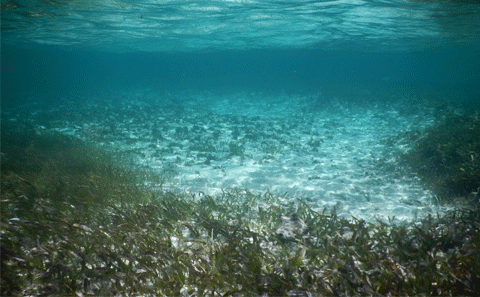
The National Oceanography Centre (NOC), UK Hydrographic Office (UKHO) and Centre for Environment, Fisheries and Aquaculture Science (Cefas) are undertaking a series of surveys in Antigua and Barbuda to improve the Government’s knowledge of its coastal environments and ecosystem services.
These integrated surveys form part of the Commonwealth Marine Economies (CME) Programme, which unites the UK’s world-leading marine expertise to enable sustainable economic growth and alleviate poverty in Commonwealth Small Island Developing States (SIDS).
A team of NOC scientists are currently on the island of Antigua conducting an acoustic survey and sediment coring field campaigns that will improve the understanding of the health, extent and importance of seagrass in capturing carbon. This work, which is being conducted in association with the local Department of the Environment, will measure both the depth and carbon-content of the Antiguan seagrass meadows, providing the first quantitative assessment of their blue carbon potential. The results will help to inform Antigua and Barbuda’s Nationally Defined Contribution (NDC) – a commitment made by the country to act on climate change.
The marine surveys conducted by the NOC will also provide environmental and ecosystem information that scientists from Cefas will combine with recent Satellite Derived Bathymetry data to extend the seabed habitat maps developed under Antigua and Barbuda’s National Adaptation Plan. This information will be critical to understanding the ecosystem services offered by the coastal regions and will support the Government of Antigua and Barbuda in making more informed decisions on the management of its marine estate.
James Strong, who is leading the NOC’s project and in-country surveys, said: "In addition to improving our understanding of the blue carbon potential of the seagrass meadows within Antigua, and enabling their role within Antigua and Barbuda’s NDC to be refined, this work will be relevant to other countries that have extensive seagrass habitats and are dependent on their marine ecosystems to guide sustainable economic growth.”
Lindsy Thompson, Resident British Commissioner to Antigua and Barbuda, added: “I’m delighted that our scientific experts are undertaking this important work with their Antigua and Barbudan counterparts. Their efforts are a further example of the UK’s commitment to supporting Antigua and Barbuda as it delivers priorities identified in its Maritime Economy Plan. As we head towards COP26 in Glasgow, never has it been more important for our two countries to work together to ensure NDCs are met.”
Peter Mitchell, habitat mapping and project lead for Cefas added: “For a number of years, Cefas has been developing new maps and baseline data for the Government of Antigua and Barbuda, which have contributed to its development of a National Adaptation Plan. Through the CME Programme, the complementary expertise of the UKHO, NOC and Cefas will fill gaps in these data and produce new products that will provide a more holistic understanding of the marine environment around the island of Antigua, allowing the government to improve management of its marine resources.”
Following completion of the NOC and Cefas environmental surveys, the UKHO will assist with complementary seabed mapping surveys that provide detailed maps of the seafloor required to support the habitat assessments. The seabed mapping surveys will also enable new navigational charts to be produced for greater situational awareness and safer navigation in the maritime domain. These surveys are being conducted in association with the Antigua and Barbuda Department of Marine Services and Merchant Shipping, and will support the development of the local survey team.
Ian Davies, CME Programme lead for the UKHO, said: “Since providing Antigua and Barbuda with equipment several years ago under the CME programme, UKHO has provided training and support to the local survey team to develop the capacity for them to undertake seabed mapping. The support being provided this year will ensure that the survey team have the skills and capacity to continue mapping of Antigua and Barbuda’s waters, providing crucial information which can be used for future sustainable development of the country’s Blue Economy.”
The CME Programme is funded and delivered on behalf of the UK Government to aid Commonwealth SIDS. It is led by the Foreign, Commonwealth and Development Office (FCDO) and aims to ensure marine resources that belong to Commonwealth SIDS are better understood and managed, with the aim of enabling sustainable and growing marine economies that create jobs, drive national economic growth, reduce poverty, ensure food security and build resilience.
More information about the CME Programme.
View Antigua and Barbuda’s Maritime Economy Plan.
Read further details about the projects delivered by the NOC through the CME Programme.